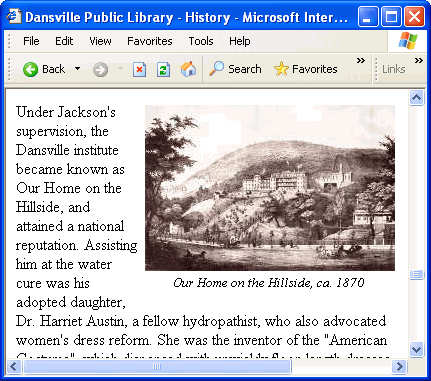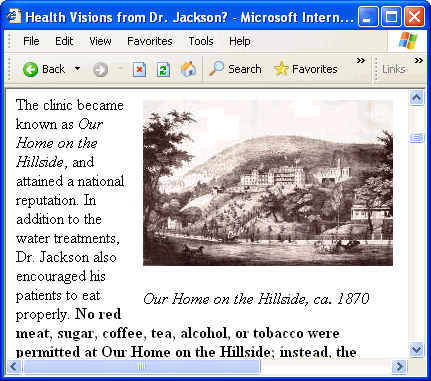| Ellen G. White |
Prophet for Today? We Analyze, You Decide! |
Fair & Balanced |
Return to https://www.TruthOrFables.net/dirk-anderson-plagiarism.htm.
Top critic nixes plagiarism charge
We've just uncovered something rather disturbing, and would like to inform our readership about it. Dirk Anderson, one of Ellen White's most avid critics, regularly condemns her for alleged plagiarism. (We say "alleged," for we have yet to see valid and untampered-with proof of the charge.) Yet we have just discovered evidence that Dirk has believed for years that there is absolutely nothing wrong with pretending that you wrote something that you really copied from someone else.
We present for your consideration the following comparison between one of his web pages and something posted on another web site around 1997. To be fair and balanced, we have given in their entirety three paragraphs from both web pages. We have not shortened these paragraphs at all, and thus are not trying to skew the evidence. The text highlighted in yellow is an exact match:
| Dirk Anderson, "Mrs. White's Health Visions: Was it God? Or Dr. Jackson?" | David Gilbert, "Dansville's 'Castle on the Hill' " (c. 1997) |
|---|---|
| Dr. James Caleb Jackson was born in 1811. Early in his life he worked as a lecturer and publisher of abolitionist newspapers; but he was hampered by extremely poor health. In fact, he was at death's door when he visited a water cure, and his near-miraculous recovery made Jackson a life-long advocate of hydropathy. Later, he obtained a medical degree, and in October of 1858 he moved to Dansville, New York, to open a water-cure clinic. | Dr. James Caleb Jackson was born in Onondaga County in 1811. Early in his life he worked as a lecturer and publisher of abolitionist newspapers; but he was hampered by extremely poor health. In fact, he was at death's door when he visited a water cure; and his near-miraculous recovery made Jackson a life-long advocate of hydropathy. He obtained a medical degree, and operated a water cure in Cortland County before relocating to Dansville. |
| The clinic became known as Our Home on the Hillside, and attained a national reputation. In addition to the water treatments, Dr. Jackson also encouraged his patients to eat properly. No red meat, sugar, coffee, tea, alcohol, or tobacco were permitted at Our Home on the Hillside; instead, the emphasis was on fruits, vegetables, and unprocessed grain. Jackson also promoted a two-meal-a-day diet. Jackson is credited with the invention of the first cold breakfast cereal, a graham-flour-derived recipe he named Granula. | Under Jackson's supervision, the Dansville institute became known as Our Home on the Hillside, and attained a national reputation. . . . [See below for the rest of this paragraph.] In addition to the water treatments, Dr. Jackson also encouraged his patients to eat properly. No red meat, sugar, coffee, tea, alcohol, or tobacco were permitted at Our Home on the Hillside; instead, the emphasis was on fruits, vegetables, and unprocessed grain. Jackson is credited with the invention of the first cold breakfast cereal, a graham-flour-derived recipe he named Granula. For several decades the manufacture and sale of Granula was a lucrative sideline. |
| However, when Mrs. White visited the Dansville clinic she began to see value in the reform dress. Assisting Dr. Jackson at the water cure was his adopted daughter, Dr. Harriet Austin, a fellow hydropathist, who advocated women's dress reform. She was the inventor of the "American Costume", which dispensed with unwieldy floor-length dresses in favor of a mid-length skirt worn over trousers (see picture of Dr. Austin on right). | [This portion is the missing portion of the second paragraph above.] Assisting him at the water cure was his adopted daughter, Dr. Harriet Austin, a fellow hydropathist, who also advocated women's dress reform. She was the inventor of the "American Costume", which dispensed with unwieldy floor-length dresses in favor of a mid-length skirt worn over trousers. It was more practical, but never gained wide popularity. |
Count and see: 186 of the 236 words in Dirk's three paragraphs come from David Gilbert, with no credit given whatsoever. That's 79%. Perhaps Dirk could have gotten away with this wholesale copying in Ellen White's day, given the difference in standards back then, but not today. Especially is this so since he is so condemnatory and intolerant of 19th century writers who borrowed a few words here and there from others.
We enquired of the Dansville Public Library to see if Dirk had asked permission to use this material from their web site. Here is the reply we received on December 12, 2004:
|
I am not aware that permission was sought to use excerpts from the "Dansville's 'Castle on the Hill' essay by David Gilbert from the Dansville Public Library website, nor to use the image of "Our Home on the Hillside" on the EllenWhite.org site. Tony Witte |
Bizarre isn't it? Using the less charitable language Dirk himself uses when he talks of the alleged plagiarism of Ellen White, it appears that Dirk "stole" a picture from the Dansville Library site, and even "stole" its caption. First, here's a snapshot of David Gilbert's essay on the Dansville Public Library web page:

Now here's a snapshot of Dirk's page showing the "stolen" picture and caption:

We find the "stolen" picture extremely troubling, given the fact that we received a number of emails about our use of his picture from his web site. American copyright law allows for what is called "fair use." If a work is being commented upon or critiqued, then excerpts can be used without getting permission. Perhaps we were wrong, but we considered it fair use to use a cropped picture of Dirk on one of our web pages that evaluates his research and theology.
Here are excerpts from a few emails that we received from him. The first is from February 7, 2004:
|
This one is from February 8, 2004:
|
You cannot use the picture on your web site. I paid a photographer for that picture, it is copyrighted, as is all the material on our web site, and I have never given you or anyone permission to use it on their web site. If you want to purchase the rights to use that picture, we can negotiate terms. In the interim, please remove it from your web site. |
What we ended up doing was taking a snapshot of his web page and using that, which in our mind would most definitely constitute fair use. We never heard from Dirk again on that issue, which coincidentally coincided with the disappearance of our page on Dirk from the #1 spot on Google's search results.
Back to Dirk's web page, "Mrs. White's Health Visions: Was it God? Or Dr. Jackson?" It wouldn't be so bad if Dirk hadn't claimed to be the author, but we find that his Site Map page makes that very claim:
| Index by Author |
|---|
Anderson, Dirk (web site editor)
. . . |
There is always the possibility that, unknown to us, a 19th century author did indeed obtain permission to copy and was not required to give credit. But today's standards are different. Even if Dirk had asked Dr. Witte for permission to use material from the Dansville Public Library's web site, he must still give credit when copying that material verbatim.
Yet after more than 4½ years, no credit is being given on his web page. How much of his other material has also been "plagiarized"?
Thus, we are forced to conclude that Dirk does not believe that plagiarism is all that big a deal. And if he believes that plagiarism is fine today, especially for critics of Ellen White, then he must certainly have no problem with a 19th century writer using a few words here and there from others, especially since that wasn't considered plagiarism at the time.
Epilogue
We've posted the rest of the story on a separate web page.
Give Us Your Opinion
| What do you think of Dirk Anderson's "plagiarism"? |
|
|
© 2004
TruthOrFables.net